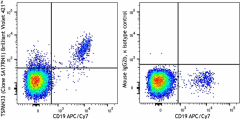- Clone
- SA17RN1 (See other available formats)
- Regulatory Status
- RUO
- Other Names
- Tetraspanin-33, BAAM, Penumbra, PEN
- Isotype
- Mouse IgG2b, κ
- Ave. Rating
- Submit a Review
- Product Citations
- publications

-

Human peripheral blood lymphocytes were stimulated overnight with recombinant human CD40L (TNFSF5) plus IL-4 and were stained with CD19 APC/Cyanine7 and TSPAN33 (BAAM) (clone SA17RN1) Brilliant Violet 421™ (left) or mouse IgG2b, κ Brilliant Violet 421™ isotype control (right).
| Cat # | Size | Price | Quantity Check Availability | Save | ||
|---|---|---|---|---|---|---|
| 395410 | 100 tests | 348€ | ||||
TSPAN33, also known as BAAM, is a 32 kDa protein member of the TM4 superfamily (TM4SF). TSPAN33 have four transmembrane regions and two extracellular loops, one of them is a cysteine-rich long extracellular loop (LEL), characteristic of the TM4SF. TSPAN33 interacts with different molecules such as integrins and other tetraspanins. TSPAN33 is expressed by activated B cells, some B cell lymphomas, macrophages and in cells from the convoluted tubules and collecting ducts in the kidney. In macrophages TSPAN33 modulates TLR-induced proinflammatory gene expression, but its function in other cells is unknown.
Product DetailsProduct Details
- Verified Reactivity
- Human
- Antibody Type
- Monoclonal
- Host Species
- Mouse
- Immunogen
- Human TSPAN33-transfected cells
- Formulation
- Phosphate-buffered solution, pH 7.2, containing 0.09% sodium azide and BSA (origin USA).
- Preparation
- The antibody was purified by affinity chromatography and conjugated with Brilliant Violet 421™ under optimal conditions.
- Concentration
- Lot-specific (to obtain lot-specific concentration and expiration, please enter the lot number in our Certificate of Analysis online tool.)
- Storage & Handling
- The antibody was purified by affinity chromatography and conjugated with Brilliant Violet 421™ under optimal conditions. The solution is free of unconjugated Brilliant Violet 421™ and unconjugated antibody.
- Application
-
FC - Quality tested
- Recommended Usage
-
Each lot of this antibody is quality control tested by immunofluorescent staining with flow cytometric analysis. For flow cytometric staining, the suggested use of this reagent is 5 µl per million cells in 100 µl staining volume or 5 µl per 100 µl of whole blood.
Brilliant Violet 421™ excites at 405 nm and emits at 421 nm. The standard bandpass filter 450/50 nm is recommended for detection. Brilliant Violet 421™ is a trademark of Sirigen Group Ltd.
Learn more about Brilliant Violet™.
This product is subject to proprietary rights of Sirigen Inc. and is made and sold under license from Sirigen Inc. The purchase of this product conveys to the buyer a non-transferable right to use the purchased product for research purposes only. This product may not be resold or incorporated in any manner into another product for resale. Any use for therapeutics or diagnostics is strictly prohibited. This product is covered by U.S. Patent(s), pending patent applications and foreign equivalents. - Excitation Laser
-
Violet Laser (405 nm)
- RRID
-
AB_2801046 (BioLegend Cat. No. 395410)
Antigen Details
- Structure
- Member of the TM4 superfamily, TspanC8 subgroup, 32kD, 4 transmembrane regions, 1 cysteine-rich long extracellular loop (LEL).
- Distribution
-
Activated B cells, some B cell lymphomas, macrophages, convoluted tubules and collecting ducts from kidney
- Function
- Modulates TLR-induced proinflammatory gene expression
- Cell Type
- B cells, Macrophages
- Biology Area
- Cancer Biomarkers, Immuno-Oncology, Signal Transduction
- Molecular Family
- Adhesion Molecules
- Antigen References
-
- Pérez-Martínez CA, et al. 2017. Scand J Immunol. 86:23.
- Ruiz-García A, et al. 2016. J Immunol. 197:3371.
- Luu VP, et al. 2013. Clin Immunol. 149:388.
- Chen Z, et al. 2005. Cancer Genet Cytogenet. 162:95.
- Maecker HT et al. 1997. FASEB J. 11:428.
- Gene ID
- 340348 View all products for this Gene ID
- UniProt
- View information about TSPAN33 on UniProt.org
Related FAQs
- What is the F/P ratio range of our BV421™ format antibody reagents?
-
It is lot-specific. On average it ranges between 2-4.
Other Formats
View All TSPAN33 Reagents Request Custom Conjugation| Description | Clone | Applications |
|---|---|---|
| Purified anti-human TSPAN33 (BAAM) | SA17RN1 | FC |
| PE anti-human TSPAN33 (BAAM) | SA17RN1 | FC |
| APC anti-human TSPAN33 (BAAM) | SA17RN1 | FC |
| Biotin anti-human TSPAN33 (BAAM) | SA17RN1 | FC |
Compare Data Across All Formats
This data display is provided for general comparisons between formats.
Your actual data may vary due to variations in samples, target cells, instruments and their settings, staining conditions, and other factors.
If you need assistance with selecting the best format contact our expert technical support team.
-
Purified anti-human TSPAN33 (BAAM)

Human peripheral blood lymphocytes resting (right) or stimul... -
PE anti-human TSPAN33 (BAAM)

Human peripheral blood lymphocytes resting (right) or stimul... -
APC anti-human TSPAN33 (BAAM)

Human peripheral blood lymphocytes were stimulated overnight... -
Biotin anti-human TSPAN33 (BAAM)

Human peripheral blood lymphocytes stimulated overnight with...

 Login / Register
Login / Register 













Follow Us